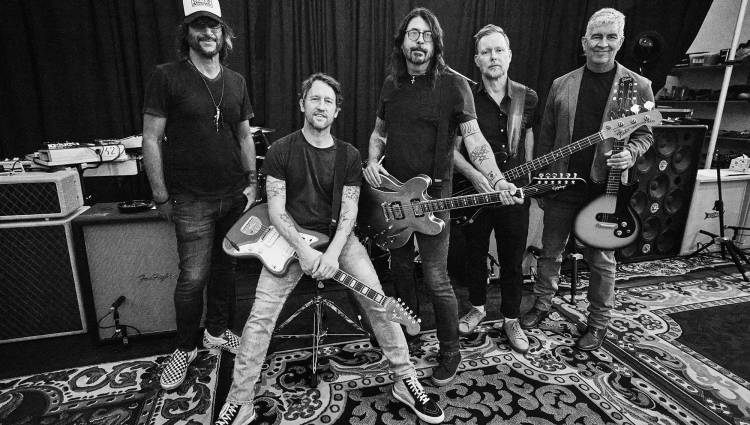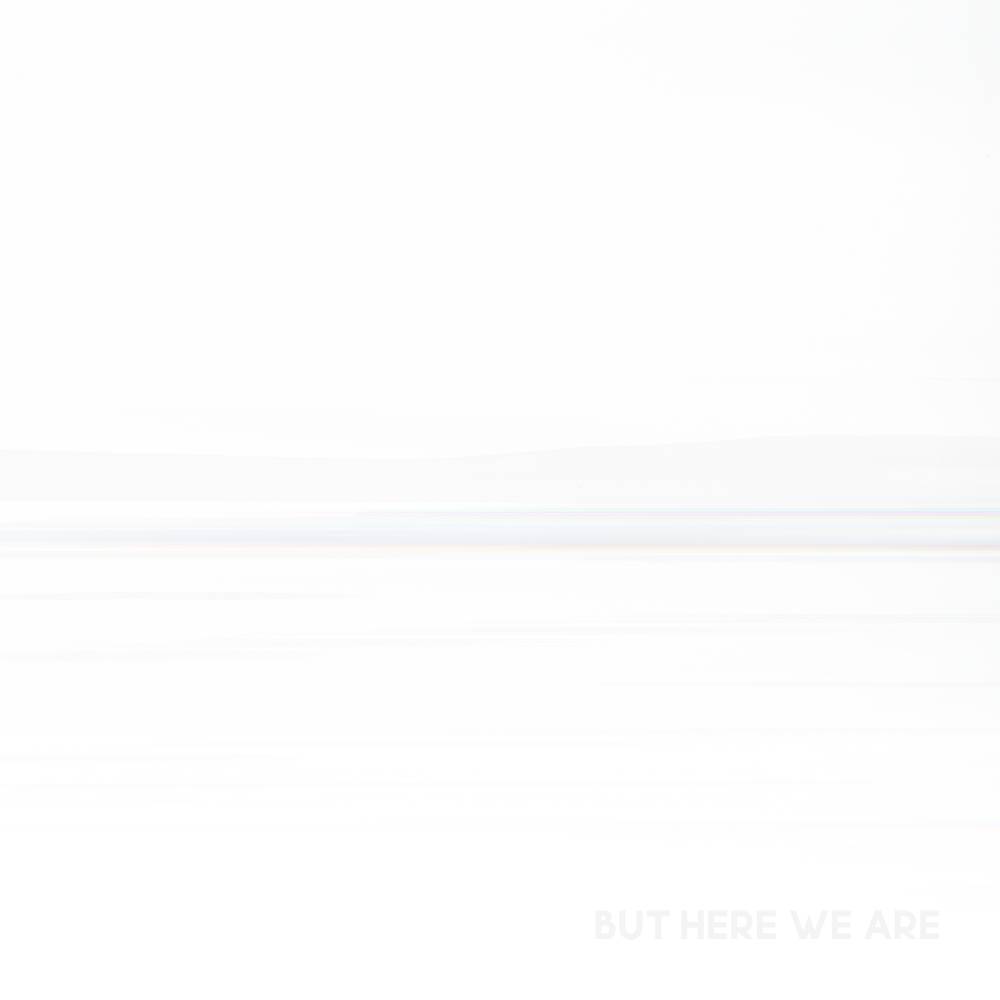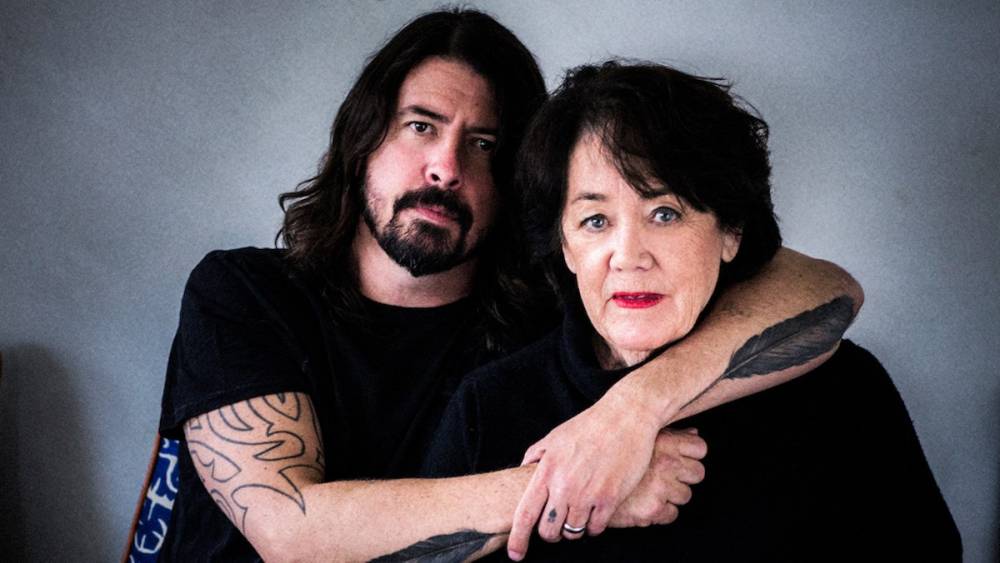
Credit: Danny Clinch
This is an album Foo Fighters would never have wanted to make - but it was the only one they could have made, and obviously needed to.
But Here We Are, the band's eleventh studio album, is a collection about the messiness, complexity, and non-linearity of grief. The loss of their beloved brother and bandmate Taylor Hawkins in March 2022 delivered the first blow; the second came with the loss of Dave Grohl's mother Virginia mere months later. By their own admission, there was a period in the last year when they were uncertain about whether or not they would be able to continue as a group. But it seems that it's through seeking solace and support in one another that they discovered that there was something they could offer to each other and the world right now, and in doing so, take a first step - and a deep breath - on the road to recovery. A Japanese proverb "Nana korobi, ya oki", meaning "fall down seven times, stand up eight", speaks of hope and resilience in the face of great difficulty. You will inevitably be knocked down, but just as certainly, you must get up again.
On the other hand, it could be argued that this was inevitable. Foo Fighters are a group that, from the very beginning, has evolved by crawling out from the ruins. This album doesn't pretend to hold the answers, but it's a compelling and deeply moving examination of the questions.
In making art of their suffering, they have given us the most heartfelt gift of themselves. But Here We Are headlines a new chapter in the band's lives, but contains music that comes from a highly-developed sense of self. Foo Fighters have never sought total reinvention of their sonic identity, choosing instead to expand, to increase their lung capacity. However, this album also contains substantial footprints of their past works, wrapping itself in a comforting blanket of familiarity.

Take the opening track, 'Rescued': An introductory narration of the album's thematic content. The galloping drum interlude, like a racing heartbeat, gives a glimpse into the dizzying panic brought on by sudden shock. Yet the song is also hopeful, pleading - one of many dimensions of pain that the album will go on to explore. But this is couched in a musical profile that is unmistakably Foo Fighters. It feels like a deliberate choice to ease the listener into what will later unwind into some challenging contemplation. 'Under You' stays in familiar territory and excites the fans who have longed for the return of the "old-school" post-grunge sound, but its upbeat danceability contradicts the story being told and the heavy emotional burden being conveyed. We are still in the early shock and denial stages of grief here, hovering between "times that I need someone" and "times I feel like no one" - even when surrounding ourselves with people, if we are longing for the one person who can't be there and the shared life we had, we find ourselves uniquely lonely.
Amid the album's exploration is a grapple with vulnerability. As a lyricist, Dave Grohl has historically been guarded, obscuring his testimonies in a universal tale. Here - because much of the subject matter is readily apparent - the material is presented with unprecedented candour. Given that he is staring down death, the tone of that conversation will, sooner or later, be direct and intimate - one of the most personal that a person will ever have. There are some cards, one senses, that he still keeps close to his chest, and should not go into this expecting a complete performance of grief...one of many reasons being that it is an experience still being lived, and thus it is still changing shape. With that being said, But Here We Are makes room for that, and understands that it documents an event still unfolding and revealing itself.
"Every night I tell myself/nothing like you could last forever" from 'Hearing Voices' conjures the memory of 'Everlong' as well as Taylor. Beginning by singing almost in a whisper, we are invited into the empty room where the song is set, before Dave fills the air with a call to the voice he wishes he could hear. The song fades to a brief piano transition before we are left with what seems like a demo version of the song, just Dave and a guitar - perhaps in the same quiet room of which he speaks - repeating "speak to me, my love". It is a simple but clever way to convey a tormenting silence, a cavernous space once taken up by a great presence.
There is a nervous energy to the title track. The flipping of time signatures between verse and chorus, coupled with Dave's weathered vocal work, conveys agitation, which is punctuated by the frenzied final third. It wishes to be optimistic but seems to admit it had little to work with at the time. "I gave you my heart but here we are" may question the meaning of having love for someone for it only to end, and for that love to have nowhere to go now. Chris and Pat's guitars are razor sharp here, and each of Nate's bass plucks feel like hammers, or fists pounding on a wall.
'The Glass' has obvious aural callbacks to the Lennon/McCartney songwriting partnership, and likely for good reason - it seems to especially recapture 'Free As A Bird', another song that a band made in the absence of a core member. I would also venture to suggest a Neil and Tim Finn comparison, music that is deceptively simple and accessible, but expresses a sincerity and soulfulness that is gently, modestly revealed. Here, Dave is the most candid about his relationship with Taylor and the gravity of no longer hearing his heart's echo. Yet the metaphorical glass also represents a barrier that now separates the two, with Dave "waiting on this side". This mid-tempo ballad speaks of homesickness that wavers on feeling eulogical, if not for the prayer of hope in its conclusion: "Waiting for this storm to pass".
A tonal shift comes with 'Nothing At All'. The chorus revives the early Foo Fighters post-grunge sludge, extending to the distorted vocal effect that, in my opinion, they could have done without and achieved the same emotional impact. The wall of cymbals and tumbling drum fills add to the apprehension. On the other side of the coin, the verses are more subdued, as though the subject is pausing for breath and gathering their thoughts. The result is a satisfying release of the emotions often downplayed or denied in bereavement, but no less valid.
The second half of the album is ushered in by the most unexpected offering, 'Show Me How'. The song is a conversation between Dave and his eldest daughter Violet, as a tribute to their mother and grandmother Virginia. Reassuring her spirit as much as one another, the song doubles as a pledge to shelter and protect as she did. Dave and Violet's vocal blend is exquisitely touching. The band's accompaniment is spacious and gorgeously textured. For an album framed around the navigation of sorrow, this track has a quality to it that allows the listener to relax and breathe.
Moving towards the album's closing sees the band contemplating the future in 'Beyond Me'. "If it all ended today, would you be fine?" is not a hypothetical question for them, and so follows a consideration of what 'fine' might look like, and what that requires from them. They consider the inevitability of time's passage and the lack of control they have over that. Dave's vocal delivery is airy in parts and blatantly weary in others, and Rami's keys move forward in place of a drum track for the first half - until they, along with the rest of the band, crash into the soundscape. Foo Fighters are taking us to church here, not to rejoice but to find understanding and purpose. Chris also comes to the fore in this song, bringing it to its crescendo and at times sounding like a desperate wail.

'The Teacher', the longest song in the band's recorded history, directly addresses Virginia and takes its time telling its story, resulting in a powerful rock opera. Building and stirring tension with each segment, each "wake up" becomes more urgent, underpinned by a tumultuous instrumentation that becomes more menacing when that call goes unanswered. Then, jarringly, all is quiet again, a pensive mood washing over: "You showed me how to breathe, but never showed me how to say goodbye." A chant of "by breath..." echoes over a mournful melody. We are alone. The climax is distraught and absolutely massive, oppressive static washing over it until it disappears into a cacophony of noise, like a scream coming from deep in the belly - until it abruptly ends. I cannot praise each band member's contributions highly enough here. Any capable prog-rock enthusiast could play something like this, but only those with a shared musical language like Foo Fighters could follow one another through its emotional peaks and valleys.
We close on 'Rest', and a return to the atmosphere of being in a quiet room with only heartache for company. Dave sings and yet barely makes a sound, his tone utterly bereft. The song describes the rituals of death and the hope of peace that passing over could bring. He sings for an audience of one, knowing they will not hear it, but holds onto the thread all the same. It is devastatingly beautiful. As though they know they are needed, the full band arrives with a jolting eruption, almost a primal scream. A marching snare carries the departed along. "Rest, you will be safe now," they promise as much as any person can do when reckoning with the duality of life and death. The living are left, defenceless against these forces, to quantify how their very being has been shaped because of that person existing for a brief time in the world. It's a song you never want to hear again, because of how intimately it describes such sorrow. As a closer, 'Rest' is a most loving epitaph that will linger long after the final strum.